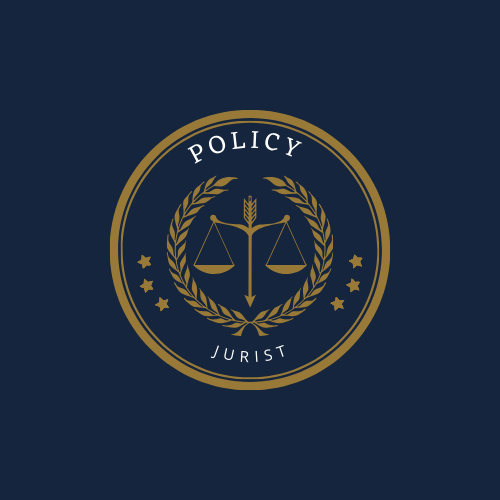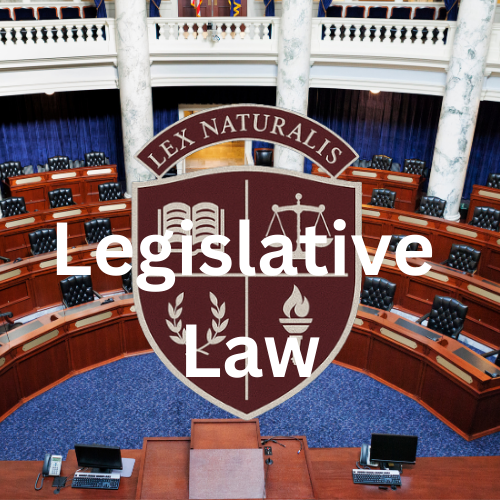Defining the Policy Jurist Part II
- Dr. Byron Gillory
- Aug 18
- 6 min read

Introduction
The legal profession is undergoing a transformation. In an age marked by legislative overload, judicial fragmentation, and administrative expansion, the boundaries between law, politics, and policy have blurred. Traditional roles—the legislator, the lawyer, the judge, and the bureaucrat—each play their part, but none alone ensures the coherence and legitimacy of law as an integrated system of governance. Within this widening gap emerges a new figure: the Policy Jurist.
To define the Policy Jurist requires more than offering a job description. It calls for an articulation of ethos, competencies, and professional boundaries. It demands a comparison with existing legal roles, a genealogy that situates the Policy Jurist within the history of jurisprudence, and a projection of how this role might anchor constitutional governance in the 21st century.
This essay undertakes that task in four movements:
The Ethos of the Policy Jurist.
Distinction from Other Legal Roles.
The Professional Identity of the Policy Jurist.
The Institutional Future of Policy Jurisprudence.
I. The Ethos of the Policy Jurist
Every profession is defined not merely by what it does but by the virtues that animate its practitioners. For the Policy Jurist, three commitments form the core ethos: constitutional fidelity, policy rationality, and linguistic precision.
1. Constitutional Fidelity
At its root, law is more than text—it is an architecture of authority, a distribution of power, and a safeguard of liberty. The Policy Jurist recognizes that statutes are not free-floating commands but must be tethered to the higher order of constitutional governance. Drafting a statute without reference to constitutional constraints is akin to building a structure without foundations.
Fidelity here means more than formal compliance. It involves a substantive commitment to constitutional integrity: the separation of powers, the protection of individual rights, and the preservation of federal balance. Where legislatures may be tempted to expand power or courts to stretch interpretation, the Policy Jurist acts as a guardian of boundaries.
2. Policy Rationality
Law is not only a matter of constitutional conformity but of practical consequence. The Policy Jurist embraces the duty to design statutes that are economically coherent, socially sustainable, and administratively feasible. Unlike the policy analyst who merely forecasts, the Policy Jurist integrates analysis into normative design.
This requires tools drawn from economics (to assess incentives and costs), history (to recognize precedent and trajectory), and political philosophy (to discern the ends of governance). In this sense, the Policy Jurist is both engineer and ethicist, building rules that not only work but also serve the common good.
3. Linguistic Precision
Words are the raw material of law. Ambiguity breeds litigation, inconsistency undermines enforcement, and vagueness invites bureaucratic overreach. The Policy Jurist regards linguistic precision as a moral duty.
Every clause, every definition, and every cross-reference must be crafted with care. The Policy Jurist avoids jargon that clouds meaning and resists the temptation of political slogans masquerading as statutes. The goal is durability: a law that can be read, applied, and enforced without distortion for decades to come.
Together, these three commitments form the ethos of policy jurisprudence: law as a coherent system, principled in foundation, rational in consequence, and precise in form.
II. Distinction from Other Legal Roles
The Policy Jurist cannot be understood without contrast. What distinguishes this figure from existing actors in the legal ecosystem?
1. Legislator vs. Policy Jurist
The legislator is a political actor. Elected officials must negotiate compromise, appease constituencies, and navigate the partisan terrain. In doing so, they often prioritize expediency over principle. Statutes become bargaining chips rather than enduring structures.
The Policy Jurist, by contrast, is not bound by electoral incentives. Their task is not to secure votes but to craft statutes that endure. They supply the intellectual architecture—the blueprint—upon which legislators may act. Whereas the legislator builds political coalitions, the Policy Jurist builds legal coherence.
2. Attorney vs. Policy Jurist
Attorneys are advocates. They argue within the framework of existing law, defending clients’ interests through litigation, negotiation, or counsel. Their professional training is adversarial, rooted in rhetoric and precedent.
The Policy Jurist, however, does not argue cases; they design the framework itself. They must anticipate not only how a statute will be litigated but also how it will be interpreted, enforced, and amended. Where the attorney sharpens arguments, the Policy Jurist sharpens statutes.
3. Judge vs. Policy Jurist
Judges interpret law. They resolve disputes by applying statutes to particular cases. Their role is reactive: law comes before them, and they must pronounce meaning.
The Policy Jurist, in contrast, operates proactively. They work upstream, preventing disputes by drafting law with clarity. While judges guard legal consistency through interpretation, Policy Jurists guard it through design.
4. Policy Analyst vs. Policy Jurist
Policy analysts, often found in think tanks or government offices, study social problems and propose solutions. Yet their proposals often remain at the level of white papers or reports. They lack the technical mastery to translate ideas into statutory language.
The Policy Jurist is that translator. They bridge the gap between policy theory and legal reality. Where the analyst provides diagnosis, the Policy Jurist prescribes architecture.
III. The Professional Identity of the Policy Jurist
Having distinguished the Policy Jurist from adjacent roles, we may now define their professional identity. This identity can be described across three dimensions: hybrid vocation, guardian ethos, and methodological discipline.
1. A Hybrid Vocation
The Policy Jurist is not a new invention but a fusion. They blend jurisprudence (the study of legal principles), legislation (the craft of statutory design), and policy (the analysis of governance outcomes). This hybrid vocation positions the Policy Jurist uniquely: not in courtrooms, not in parliaments, but in the workshop of statutory architecture.
2. A Guardian Ethos
The Policy Jurist sees themselves not as partisan advocate but as guardian of constitutional order. This ethos requires independence from political capture, a commitment to truth in language, and fidelity to the governed rather than the government. Professional codes must reflect this ethos, ensuring that Policy Jurists resist both the temptations of partisanship and the pressures of expediency.
3. A Methodological Discipline
Identity is also shaped by method. The Policy Jurist relies upon:
Comparative Law to evaluate how different systems structure similar problems.
Economics and Public Choice Theory to foresee incentives and unintended consequences.
Political Philosophy to ground statutes in principles of justice.
Linguistics to ensure precision of drafting.
History to learn from past statutes that endured—or failed.
This methodological pluralism makes the Policy Jurist distinct from both doctrinal lawyers and policy technocrats.
IV. The Institutional Future of Policy Jurisprudence
If the Policy Jurist is to emerge as a recognized profession, institutional scaffolding must support its development.
1. Education
Traditional JD programs focus on litigation and case analysis. A Policy Jurist requires different training: constitutional law, economics, political philosophy, and legislative drafting. Institutions like the proposed Policy JD or Academic JD in Libertarian Jurisprudence are natural pathways.
Curricula would include:
Statutory Drafting and Code Architecture
Economics for Jurists (Austrian, public choice, and regulatory economics)
Constitutional Stewardship
Legislative History and Comparative Codes
Professional Ethics of the Policy Jurist
2. Licensing and Professional Standards
Professions require boundaries. Just as attorneys are admitted to the bar, so too should Policy Jurists be admitted to a Legislative Counselor Bar. Licensing ensures competence and enforces ethical codes—truth in language, fidelity to liberty, accountability to the people.
3. Practice Settings
Policy Jurists may work in:
Legislative Firms: Analogous to law firms, specializing in statutory design.
Think Tanks and Institutes: Research centers producing model codes and policy frameworks.
Governmental Advisory Roles: Embedding Policy Jurists in legislative committees or executive offices.
International Bodies: Providing coherence in transnational law and treaty drafting.
4. A Global Vision
The rise of the Policy Jurist is not merely an American necessity. Parliamentary systems, supranational unions, and developing states all face crises of legal coherence. The Policy Jurist, as a professional identity, has global relevance: wherever law risks collapsing under bureaucracy, activism, or incoherence, Policy Jurists may serve as architects of renewal.
Conclusion
Defining the Policy Jurist requires more than functional description. It requires recognizing a new profession, animated by ethos, distinguished from existing roles, and equipped with a unique methodological discipline.
The Policy Jurist is the architect of law’s future: principled, precise, and enduring. Without such professionals, statutes will remain ad hoc, vulnerable to judicial distortion and bureaucratic creep. With them, law may once again become what it was meant to be: the rational guardian of liberty, the ordered framework of justice, the enduring covenant of a free people.

Comments